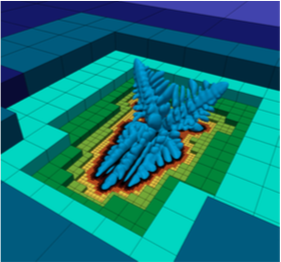
A new era for advanced materials
When UCSB Materials Professors Anton Van der Ven and Tresa Pollock accepted the invitation to the White House for the kickoff of the Materials Genome Initiative (MGI) in 2012, it was clear that a new era for Advanced Materials had reached the national agenda. In the intervening years, a broad array of federal and industrial programs aimed at developing the infrastructure to develop advanced materials twice as fast at a fraction of the cost have been initiated, with UCSB playing a major role.
As a participant in the MGI, the National Science Foundation awards a limited number of grants to researchers for Designing Materials to Revolutionize and Engineer our Future (DMREF). UCSB Materials, demonstrating its enduring excellence in developing novel material systems, along with computational and experimental tools that enable new materials design approaches, has been awarded six DMREF programs, more than any other single institution. Through collaborations with other universities and industry partners, our faculty and students lead the effort to develop innovative solutions to materials challenges that span the entire economy.
Imagine a world in which your running shirt monitors your heart rate and blood pressure and cell phones placed in your pocket easily bend when you sit. Picture a national economy significantly less reliant on foreign oil and with a continuous technological advantage in the competitive aerospace industry. Envision a world with energy costs that continue to decrease to a fraction of what they are today and clean water readily available across the globe. With the resources of the DMREF program, Materials scientists at UCSB are providing the leadership to revolutionize the future of this discipline.
Leading the new wave of research to design the next generation of materials
High temperature materials
In the initial DMREF funded, and recently refunded, by the NSF in support of the MGI, Professors Pollock and Van der Ven, with Professors Matthew Begley and Linda Petzold, are developing new pathways for the development of high temperature materials that enable higher performance aircraft engines and higher efficiency natural gas based power plants. In a novel approach that simultaneously integrates emerging computational modeling approaches, advanced high temperature experimental techniques and three dimensional characterization, system designs that combine new single crystalline substrates and advanced thermal and environmental barrier layers that improve performance have been developed and transferred to industrial partners. In the renewed program, Professor Frederic Gibou from UCSB’s Mechanical Engineering Department joined the team.
Atomic Scale processing
Two of the DMREF programs focus on processes occurring at the atomic scale. UCSB Materials Professors Van der Ven and Carlos Levi, along with Professors Krishnakumar Garikipati and Emmanuelle Marquis, both from the University of Michigan, are creating frameworks to predict the evolution of the functional degradation of multicomponent materials as they operate in extreme environments, for example in nuclear reactors or in high temperature energy-storage batteries for electric vehicles. The ability to predict with atomic-scale calculations the evolution in material structure allows for development of more stable materials, which resist degradation in extreme environments. Additionally, Professors Chris Van de Walle and James Speck, and Professor Steven Ringel from Ohio State University, with the help of their students, are exploring how energy band gaps, which strongly impact power efficiency, can be affected at the atomic level by exploring advanced materials consisting of neoteric compositions and innovative layered structures.
Enhancing materials with polymers
The remaining two DMREF programs examine how polymers can be further understood through genetic algorithms and manipulated to create and enhance materials. Professors Michael Chabinyc and Craig Hawker, along with their students, are investigating the 3D printing of conducting polymers onto flexible substrates. Using computational methods to guide designs, new materials that optimize such manufacturing processes are emerging. Finally, Professors Glenn Fredrickson and Kris Delaney are investigating tools to predict and control the co-mingled architecture and nanostructure of multiblock polymers. Setting the framework and expectations for a searchable database to better expedite discovery, these scientists are at the forefront of establishing design standards for these complex polymers.
Answering the Challenge
Addressing the Grand Challenge presented by the MGI and enabled by the six DMREF programs funded by NSF, UCSB faculty and graduate students are changing the landscape of engineering materials via the design, development, and deployment of new innovative materials and tools that enable them to be rapidly deployed in advanced engineering systems.
To read the article published by The UCSB Current about the DMREF awards, please click here.



